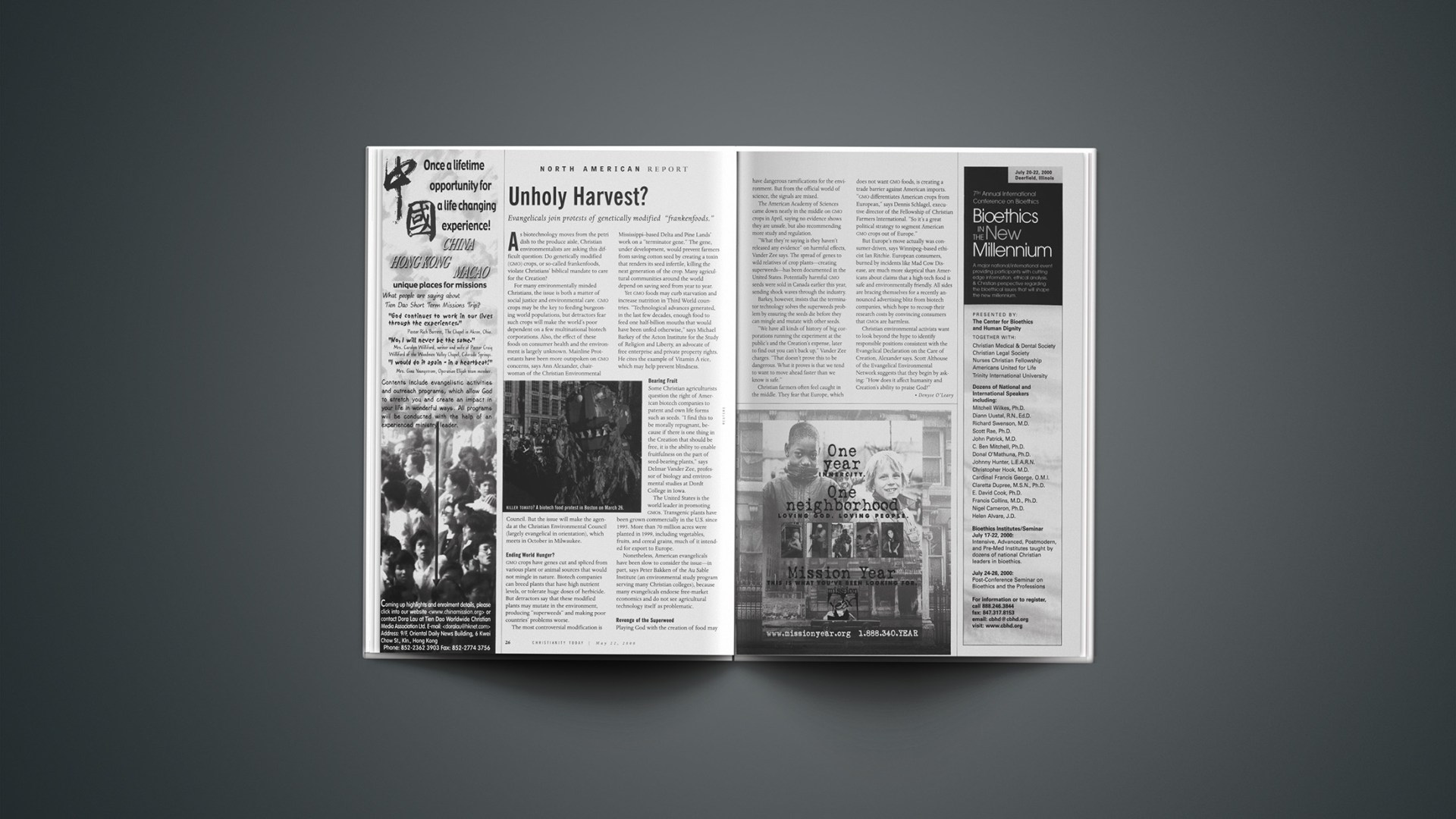As biotechnology moves from the petri dish to the produce aisle, Christian environmentalists are asking this difficult question: Do genetically modified (GMO) crops, or so-called frankenfoods, violate Christians’ biblical mandate to care for the Creation?For many evironmentally minded Christians, the issue is both a matter of social justice and environmental care. GMO crops may be the key to feeding burgeoning world populations, but detractors fear such crops will make the world’s poor dependent on a few multinational biotech corporations. Also, the effect of these foods on consumer health and the environment is largely unknown. Mainline Protestants have been more outspoken on GMO concerns, says Ann Alexander, chairwoman of the Christian Environmental Council. But the issue will make the agenda at the Christian Environmental Council (largely evangelical in orientation), which meets in October in Milwaukee.
Ending World Hunger?
GMO crops have genes cut and spliced from various plant or animal sources that would not mingle in nature. Biotech companies can breed plants that have high nutrient levels, or tolerate huge doses of herbicide. But detractors say that these modified plants may mutate in the environment, producing “superweeds” and making poor countries’ problems worse.The most controversial modification is Mississippi-based Delta and Pine Lands’ work on a “terminator gene.” The gene, under development, would prevent farmers from saving cotton seed by creating a toxin that renders its seed infertile, killing the next generation of the crop. Many agricultural communities around the world depend on saving seed from year to year.Yet GMO foods may curb starvation and increase nutrition in Third World countries. “Technological advances generated, in the last few decades, enough food to feed one half-billion mouths that would have been unfed otherwise,” says Michael Barkey of the Acton Institute for the Study of Religion and Liberty, an advocate of free enterprise and private property rights. He cites the example of Vitamin A rice, which may help prevent blindness.
Bearing Fruit
Some Christian agriculturists question the right of American biotech companies to patent and own life forms such as seeds. “I find this to be morally repugnant, because if there is one thing in the Creation that should be free, it is the ability to enable fruitfulness on the part of seed-bearing plants,” says Delmar Vander Zee, professor of biology and environmental studies at Dordt College in Iowa.The United States is the world leader in promoting GMOs. Transgenic plants have been grown commercially in the U.S. since 1995. More than 70 million acres were planted in 1999, including vegetables, fruits, and cereal grains, much of it intended for export to Europe.Nonetheless, American evangelicals have been slow to consider the issue—in part, says Peter Bakken of the Au Sable Institute (an environmental study program serving many Christian colleges), because many evangelicals endorse free-market economics and do not see agricultural technology itself as problematic.
Revenge of the Superweed
Playing God with the creation of food may have dangerous ramifications for the environment. But from the official world of science, the signals are mixed.The American Academy of Sciences came down neatly in the middle on GMO crops in April, saying no evidence shows they are unsafe, but also recommending more study and regulation.”What they’re saying is they haven’t released any evidence” on harmful effects, Vander Zee says. The spread of genes to wild relatives of crop plants—creating superweeds—has been documented in the United States. Potentially harmful GMO seeds were sold in Canada earlier this year, sending shock waves through the industry.Barkey, however, insists that the terminator technology solves the superweeds problem by ensuring the seeds die before they can mingle and mutate with other seeds.”We have all kinds of history of big corporations running the experiment at the public’s and the Creation’s expense, later to find out you can’t back up,” Vander Zee charges. “That doesn’t prove this to be dangerous. What it proves is that we tend to want to move ahead faster than we know is safe.”Christian farmers often feel caught in the middle. They fear that Europe, which does not want GMO foods, is creating a trade barrier against American imports. “GMO differentiates American crops from European,” says Dennis Schlagel, executive director of the Fellowship of Christian Farmers International. “So it’s a great political strategy to segment American GMO crops out of Europe.”But Europe’s move actually was consumer-driven, says Winnipeg-based ethicist Ian Ritchie. European consumers, burned by incidents like Mad Cow Disease, are much more skeptical than Americans about claims that a high-tech food is safe and environmentally friendly. All sides are bracing themselves for a recently announced advertising blitz from biotech companies, which hope to recoup their research costs by convincing consumers that GMOs are harmless.Christian environmental activists want to look beyond the hype to identify responsible positions consistent with the Evangelical Declaration on the Care of Creation, Alexander says. Scott Althouse of the Evangelical Environmental Network suggests that they begin by asking: “How does it affect humanity and Creation’s ability to praise God?”Photo by Reuters
Related Elsewhere
The UK Ministry of Agriculture, Fisheries and Food issued a report from its Committee on the Ethics of Genetic Modification and Food Use that looked at what various religious traditions are saying about GMOs.The Acton Institute is apparently the only source quoted in our story that has posted its position on GMOs on its Web site. The Evangelical Environmental Network site, for example, has many resources, but nothing on GMOs.
Copyright © 2000 Christianity Today. Click for reprint information.










